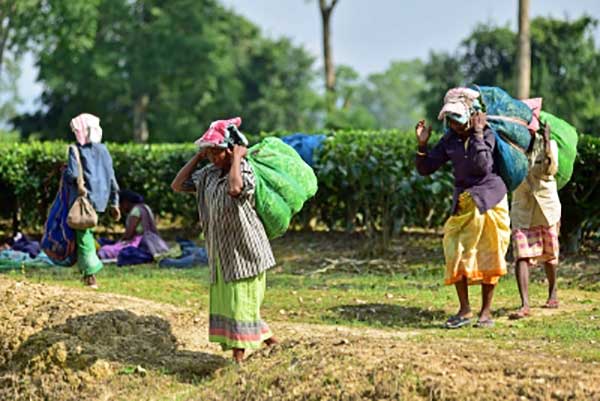Despite the assurance from the government, the long-pending demand of six ethnic groups in Assam - the tea tribes, Chutia, Koch-Rajbongshi, Matak, Moran, and Tai-Ahom - to grant Scheduled Tribe (ST) status to them is yet to be fulfilled.
The joint forum of six communities has already held several protests in the state; however, the government has been delaying and is keeping things unsettled, fearing a larger opposition from other tribes, who have expressed displeasure over new entrants to their fold.
The six ethnic groups are currently identified as OBCs in the state.
At an event in Assam soon after his victory in the 2014 general elections, Prime Minister Narendra Modi pledged to realise the six communities' long-held demand. He also criticised the Congress-led United Progressive Alliance (UPA) government for doing little for them during its 15 years in power.
However, it took the Modi government five years to take a position on the issue in January 2019, during a period of intense public outrage in Assam over the contentious Citizenship Amendment Act (CAA).
A bill to incorporate the six communities in the ST category was introduced in Rajya Sabha by then Union Minister for Tribal Affairs Jual Oram. For reasons that are best known to the BJP in power, the same was not put to a vote and allowed to expire.
In order to establish autonomous councils for the Koch-Rajbongshis, the Morans, and the Mataks in multi-ethnic Assam, the state legislative assembly enacted three pieces of legislation in 2020. The BJP government was instantly accused by the opposition of choosing a "divide-and-rule policy" with regard to the six communities vying for ST recognition.
Additionally, it was perceived as yet another effort by the BJP to win back the support of these communities ahead of the 2021 assembly elections.
Communities that meet the five requirements for ST classification - evidence of primitive features, distinctive culture, geographic isolation, reluctance to interact with the population at large, and backwardness - are those that also meet the central government's standards.
The National Commission for Scheduled Tribes (NCST) published a report in 2019 that stated: "After careful consideration, the NCST concludes that the above six communities possess characteristics of Scheduled Tribes and qualify to be included in the list of STs of Assam."
The proposal to confer ST status on the six communities of Assam has already received clearance from both the Registrar General of India and the Anthropological Survey of India.
Although the six ethnic groups believe that they have a justified demand for inclusion in the ST category, the government is hesitant due to opposition from other nine tribal communities - Mising, Bodo, Karbi, Kuki, Dimasa, Deori, Tiwa, Sonowal Kachari, and Rava - residing in Assam.
The privileges that these nine ethnic communities are entitled to under Article 46 of the Constitution would be shared by the six OBC communities that have been eyeing ST status. Interestingly, people from the unreserved category have opposed the demand for the six ethnic communities' inclusion on the ST list as well, since it would result in fewer seats in the assembly and parliament as the number of seats for the reserved category may increase.
The government never wants an unrest in Assam that may lead to a Manipur-like situation, especially as the state experienced several high-voltage agitations, including a wide-scale stir on the CAA issue. This is the reason why the demands of six ethnic communities have been kept on hold.




New Urban Community Health Centre to reduce patients rush in GBP Hospital: CM Dr Manik Saha
Chief Minister Dr Manik Saha on Thursday laid foundation stone of 50-bed Urban Community Health Center here at Agartala and said that the present government is working diligently to improve health infrastructure and services in the state.
Govt determined to develop sports infrastructure in Tripura: CM Dr Manik Saha
Chief Minister Dr Manik Saha on Thursday inaugurated football turf, athletics track and hockey ground here at Agartala Dasarath Deb Sports Complex at Badharghat and said that the government is determined to develop facilities and platform for sports persons in the state.
Mistake that benefits no one: World leaders react to Trump's 'reciprocal tariffs'
As US President Donald Trump signed an executive order on the so-called "reciprocal tariffs," the world reacted sharply against the decision, with some calling it a "mistake that benefits no one" while others called it a violation of Washington's obligations under the World Trade Organization (WTO).
Indian pharmaceutical exports get reprieve from Trump’s reciprocal tariffs
Because of the importance of India’s pharmaceuticals to US healthcare, those exports will get a reprieve from President Donald Trump’s reciprocal tariffs, according to the White House.
India stands less impacted by Trump tariffs than global peers: Industry
As US President Donald Trump announced reciprocal tariffs on dozens of countries, including India, industry experts said on Thursday that it appears India's export competitiveness to the US market stands far less impacted on a relative basis compared to global peers.
IAF pilot killed, another critical as Jaguar fighter jet crashes in Gujarat
An Indian Air Force (IAF) pilot lost his life, while another sustained critical injuries after their two-seater Jaguar fighter jet crashed near Gujarat's Jamnagar Airfield, the IAF confirmed on Thursday.
PM Modi emplanes for Thailand; to attend BIMSTEC summit
Prime Minister Narendra Modi on Thursday emplaned for Thailand on a state visit to attend the 6th BIMSTEC Summit, with his visit also set to bolster bilateral relations between New Delhi and Bangkok.
Bhavan’s Little Learners celebrate annual programme
The Bhavan’s Little Learners, Bordowali celebrated annual programme and organised prize distribution ceremony here at Agartala Rabindra Satabarshiki Bhavan on Wednesday.